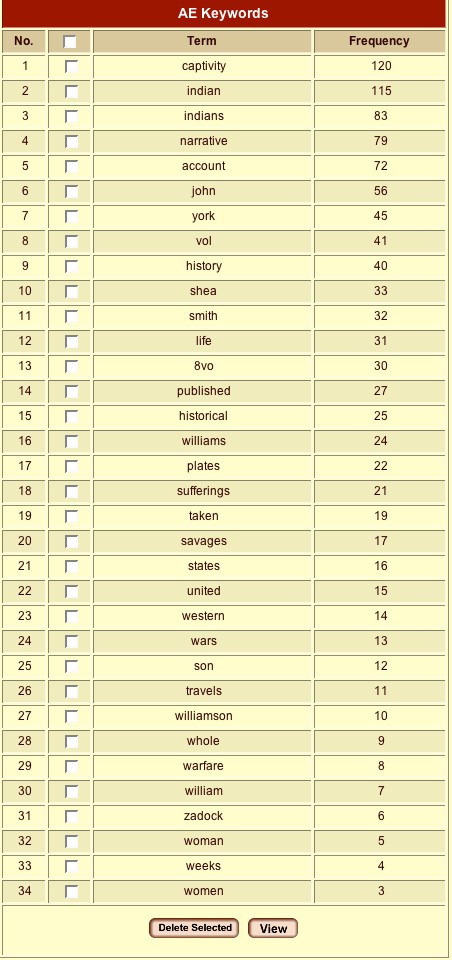<b>AE</b> Services Part 2: Get Keywords
- by Michael Stillman

"Get keywords" found 34 words which appeared at least three times in 100 listings.
By Michael Stillman
Last month we took a look at the AE Bibliographic Database, one of the subscriber services offered by this site. The "AED" consists of over 1.5 million records pertaining to books, taken from auctions, booksellers' catalogues and bibliographies. Most include prices. It is a service used by book collectors, booksellers, and historian/researchers. See http://www.americanaexchange.com/NewAE/aemonthly/article.asp?f=1&page=1&id=463. This month we look at a specific feature of that service, called "Get Keywords."
The way you access records in the AED is by a search. You can either search a particular author or title, or do a more general topical search using words or phrases. Once you do, you receive a list of matches. Here is where "Get Keywords" comes into play. It searches across the list of matches you have obtained for the most commonly used words. You simply check those records you want to search (or all of them), click the "Get AE Keywords" button, and in a moment, you will have a list of all of the most frequently used terms within those records.
Here is an example: click the image at the top left of this page for keywords we obtained from the matches after a search for "Indian Captivities." "Indian Captivities" is the term used for that once popular genre of American books that recounted tales of settlers who were captured and held by Indians. They were an effective means of stirring anti-Indian sentiment and justifying the taking of their land, the accounts generally being very one-sided.
When would you need these keywords? Three times come to mind: when buying, selling, and researching. Today, the number of books and items of ephemera available on the internet is staggering. There are many cooperative book-listing sites, there are auctions, including the specifically online type such as eBay as well as listings from the traditional auction houses, and many small, individually operated sites. There are absolute gems out there, but they can be extraordinarily difficult to find. You may be looking for items that relate to Indian Captivities, but there is no guarantee the seller has labeled them such, or is even aware of that term. So what other words have sellers of "Indian Captivities" used to describe these books in the past? The answer is to get their keywords.
As we look over the list, some are obviously commonly found, such as "Indian" and "Indians" and the ubiquitous "york" (so many books were published in New York). They don't help much. However, here are two worth remembering: "sufferings," and "savages." Not all of these writers referred to their stories as "captivities," but one of the buzzwords that regularly appeared was "sufferings," to describe what the captives endured. Likewise, "Indians" was not always the word the early settlers used to describe the native people, and it wasn't because they were calling them "Native Americans" instead. They were "savages." Of course, in hindsight we can wonder just who the "savages" were.